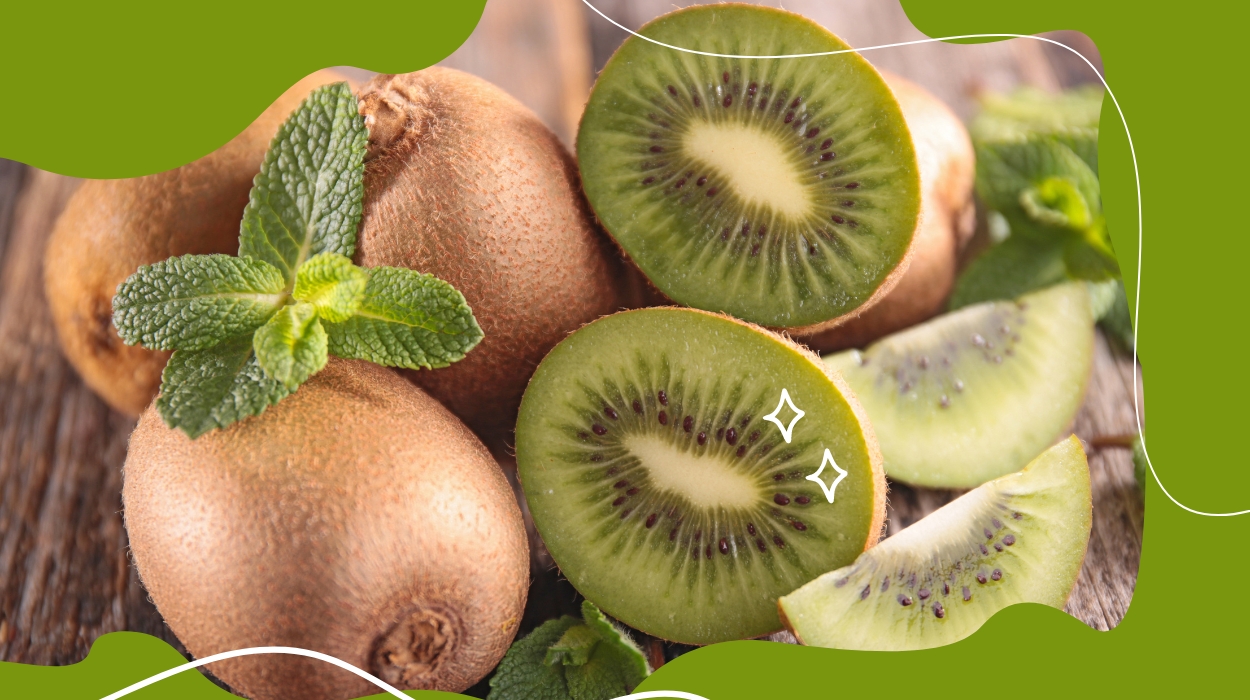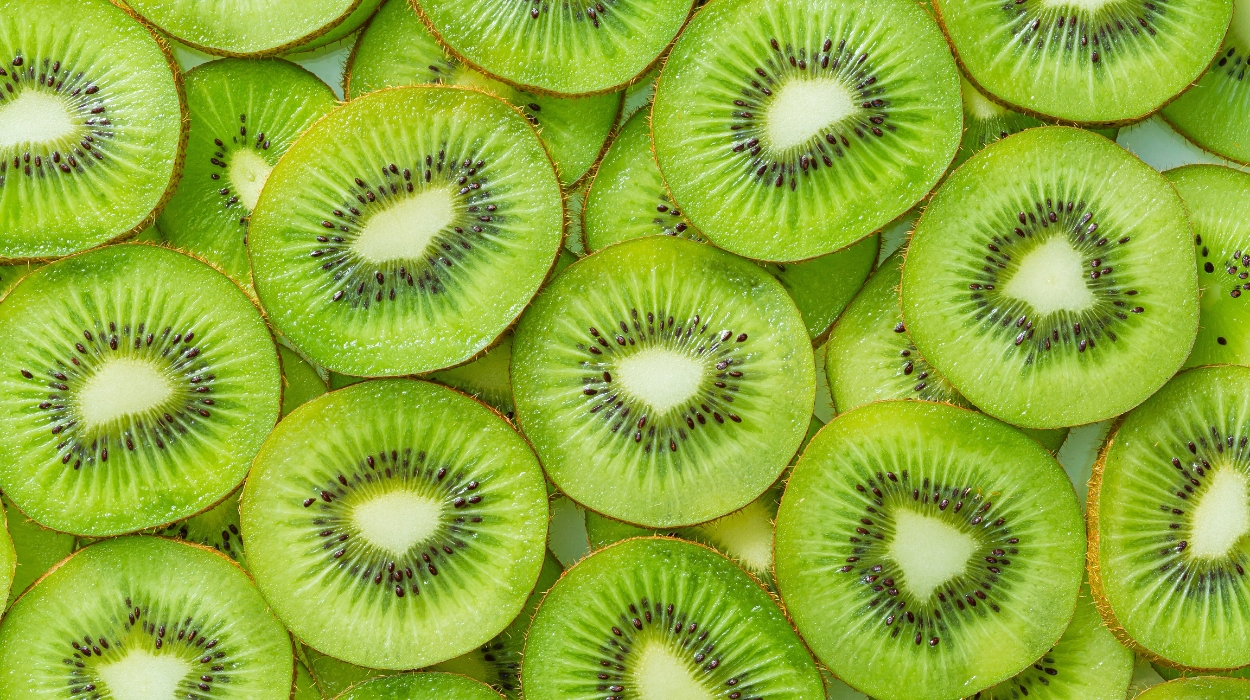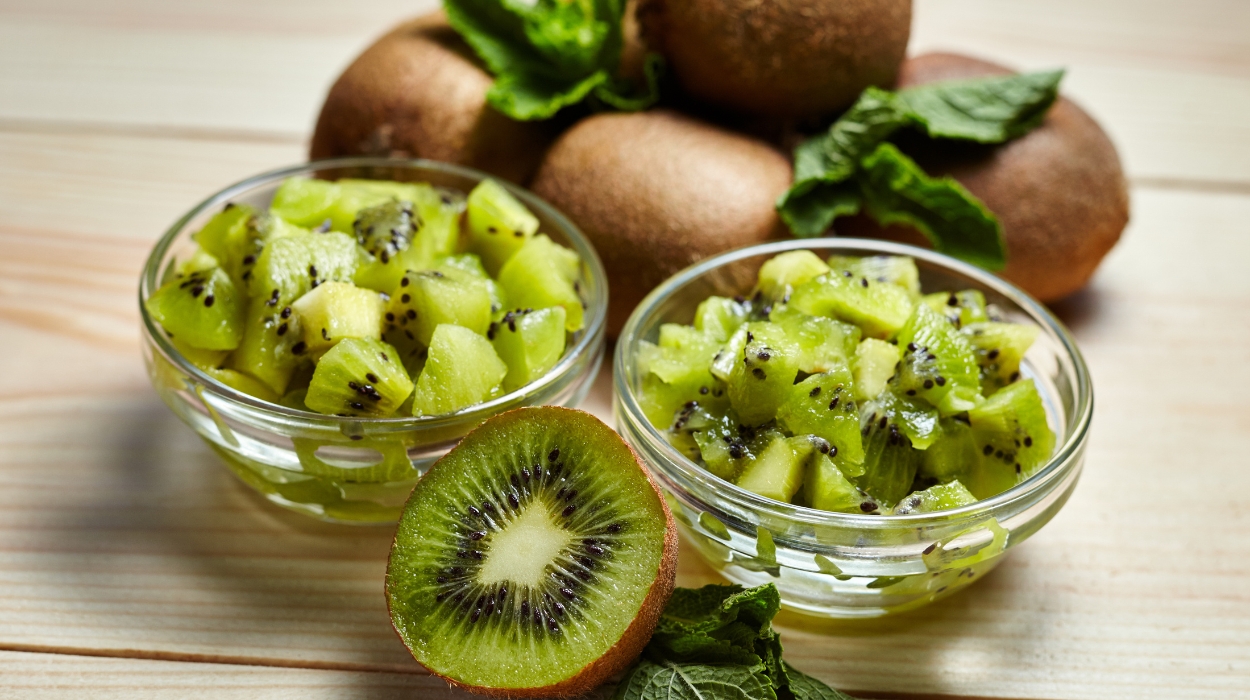 Expert's opinion
Expert's opinion
Expert's opinion
The article is a subjective view on this topic written by writers specializing in medical writing.
It may reflect on a personal journey surrounding struggles with an illness or medical condition, involve product comparisons, diet considerations, or other health-related opinions.
Although the view is entirely that of the writer, it is based on academic experiences and scientific research they have conducted; it is fact-checked by a team of degreed medical experts, and validated by sources attached to the article.
The numbers in parenthesis (1,2,3) will take you to clickable links to related scientific papers.
Is Kiwi Good For Weight Loss? Nutrition, Benefits & Risks 2024

Kiwi fruit is an exotic yet refreshing fruit with loads of nutrition, including vitamins, minerals, fiber, and many more. Kiwis are low in calories but have lots of health benefits.
But are kiwis good for weight loss? Read on to find out that answer and the benefits of consuming kiwi, as well as how to add them to your diet.
Is Kiwi Good For Weight Loss?
Kiwi is a perfect addition to your low-fat diet, but does kiwi help you lose weight? It turns out that kiwi is one of the best fruits to support your healthy weight loss plan due to several components listed below:
- Water content
- Vitamin C
- Fiber
- Low glycemic index
How Can Kiwi Help You Lose Weight?
Water Content
Kiwis, even though delicious, contain over 90% water.[1] This high water content works well with the high fiber, making you feel full, but with relatively few calories. Also, the hydration from the added water content also serves as a natural stimulant for regularity.
Vitamin C
Research[2] has proven that people with low amounts of vitamin C are resistant to body fat loss. Alternatively, people with adequate vitamin C levels can burn fat up to 30% more during exercise than people with insufficient stores of vitamin C. The correlation between vitamin C and weight loss is not fully understood, but there is a strong correlation between the two.
Fiber
Kiwi contains tons of fiber, both insoluble and soluble.[1] The insoluble fiber (found in the seeds) bulks up the stool in your intestines, while soluble fiber traps bile acids and helps to reduce blood cholesterol levels. Both types of fiber also work together to create a healthy microbiome in the small intestines. A healthy microbiome is extremely helpful in preventing cravings and overeating, and even helping with mood swings.
Low Glycemic Index

Kiwis are low on the glycemic index scale (GI), which means they digest and absorb relatively slowly into your bloodstream, which keeps your blood sugar from spiking suddenly. Foods with a low GI index are great for your body because a healthy diet with low GI foods makes it easier to lose weight.
Alternatively, a high glycemic index[3] increases the risk of certain cancers, including those of the breast, prostate, colorectal, and pancreas. A high glycemic index diet, because of frequently overtaxing the insulin-secreting cells, increases the likelihood of type 2 diabetes and heart disease.
Kiwi Fruit Nutrition
Kiwis classify as part of the berry family. The top producer of kiwi fruit is New Zealand, even though they are also grown in the United States. The two most popular types of kiwi fruit are:
- Golden kiwi: bright yellow center with a smooth brown exterior. It has a tropical taste that is similar to a mixture of strawberries and mangos.
- Fuzzy kiwi fruit: green inside and brown fuzzy outside. It has a sour and tangy fresh taste. Most popular kiwi on the market.
Kiwi berries have also become very popular because they are fast-growing and easy to eat (you can eat the skin!). Kiwi berries are approximately the same dimensions as a large grape and contain a very similar nutrient composition. They also have loads of flavor.
Not only are both of these varieties of kiwi fruit delicious, but they also have some incredible health benefits.
Nutrients
Kiwi fruit is considered one of the most nutrient-dense fruits in the world. It is rare to have such a concentrated amount of healthy compounds in a single fruit with such a low-calorie intake. Interestingly, the skin of a kiwi berry (edible) contains 15 times more antioxidants than the flesh inside the fruit.
Antioxidants are essential because they safeguard your cells against free radicals, which cause several nasty diseases such as cancer, cardiovascular disease, diabetes, and more, as well as aging.
The kiwi berry is also an excellent source of
- Beta carotene
- Chlorophyll
- Fiber
- Vitamins – vitamin E, A, C, B
- Minerals – potassium, calcium, magnesium, copper, iron, manganese
What’s even crazier is this list contains the nutrients we know the kiwi possesses. However, many of the components of the kiwi remain unstudied. So there may be many unknown nutritional benefits to the kiwi.
The kiwi fruit’s intense amount of nutrients is not high in calorie content. The nutritional value of just one kiwi contains only 60 calories, no fat content, 1 gram of protein, and tons of dietary fiber. One kiwi has almost 10% of your daily value for fiber.
Kiwi Health Benefits
Aside from burning fat and helping you lose weight, kiwis contain lots of other health benefits:
Boosting Immune System

Kiwi is high in vitamin C. Vitamin C is vital for a multitude of functions within your body, such as
- Helping your immune system function effectively
- Wound healing
- Development of tissues
- Helping iron absorption
- Potent Antioxidant
Of note, vitamin C is a water-soluble vitamin. Therefore your body’s absorption capabilities are best when taken on an empty stomach. Take vitamin C in the morning, 30 minutes before eating, for the best absorption.
Gut Health
Issues with the digestive tract are usually related to inflammation, poor digestion, and impaired motility. The anti-inflammatory compounds and fiber in kiwi often help people feel less digestive issues such as constipation, irritable bowel syndrome, diarrhea, and bloating. Also, kiwi fruits contain an enzyme called actinidin,[4] which helps digests proteins.
A 2019 study published in the Journal of Nutritional Science[5] confirms the kiwi fruit’s positive effect on digestive system disorders. Researchers investigated the daily consumption of 3 kiwi fruit over four weeks. At the end of the study, participants who consumed the kiwi fruit had markedly improved stool consistency and less stomach discomfort.
Heart Health
Everyone knows that eating fruits and vegetables is healthy for your heart. That’s because fruits and vegetables are primarily high in fiber, low in fat, and contain fewer calories than most other foods. Eating kiwis is no different. Studies have shown that eating kiwis can help reduce blood pressure and the risk of heart disease and stroke.
A recent study[6] demonstrated that kiwi inhibited an enzyme that raises blood pressure, angiotensin-converting enzyme, which improves blood pressure the same way a hypertension drug (ACE inhibitor) treats hypertension.
Side Effects Of Kiwi
Even though the potential health risks associated with consuming kiwi fruit are minimal, always be aware of the potential for an allergic reaction:
- Swelling of the mouth, lips, tongue
- Itchy or scratchy throat
- Difficulty swallowing or breathing
- Abdominal pain, cramps, bloating
- Vomiting
- Hives, eczema, or rash
Most people develop allergies during their childhood or early adult years, but it’s possible to develop allergies later in life. Therefore, when you eat kiwi fruit, you can potentially develop an allergy to them at any point in your life.
Best Ways To Add Kiwi To Your Diet
Even though you can consume kiwis in various dishes, the most popular way to eat kiwi is raw as a sweet, healthy snack. First, cut the kiwi in half and use a spoon to scoop out the fresh green fruit. Kiwi berries may be consumed raw with the peel.
Other great ways to incorporate kiwi into your diet today include
- Fruit Crisp – Add kiwi with maple syrup, flour, whole-wheat muffin mix, and a little brown sugar for a tropical fruit crisp.
- Smoothie – Add some kiwi to your breakfast fruit smoothie for an additional nutrition energizer.
- Parfait – Add kiwi to some Greek yogurt and top with crunchy granola or nuts for a lovely delicacy.
- Tropical Salsa – Make a sweet salsa to eat alongside salmon by combining kiwi with mango, red onion, lime juice, and cilantro.
- Fruit Salads – Add kiwi to your fruit salad and make it more flavorful
Conclusion
When you think of healthy food, make sure kiwi is on your list as it’s one of the most healthy foods on the planet and is a great addition to help you on your healthy weight loss journey. They are low in calories yet loaded with tons of nutrients, including fiber, vitamins, minerals, and even antioxidants that can help prevent tons of diseases.
They are also delicious and super easy to add to your daily routine (yum, fruit salad!). Therefore, next time you’re at the supermarket, pick up a pack of kiwis or kiwi berries and start enjoying the benefits. Even better, if you’re in the right climate, plant a kiwi tree and pick them up for free.
+ 6 sources
Health Canal avoids using tertiary references. We have strict sourcing guidelines and rely on peer-reviewed studies, academic researches from medical associations and institutions. To ensure the accuracy of articles in Health Canal, you can read more about the editorial process here
- Richardson, D.J., Ansell, J. and Drummond, L. (2018). The nutritional and health attributes of kiwifruit: a review. [online] 57(8), pp.2659–2676. doi:https://doi.org/10.1007/s00394-018-1627-z.
- Johnston, C.S. (2005). Strategies for Healthy Weight Loss: From Vitamin C to the Glycemic Response. [online] 24(3), pp.158–165. doi:https://doi.org/10.1080/07315724.2005.10719460.
- Federica Turati, Galeone, C., Livia and Carlo La Vecchia (2019). Glycemic Index, Glycemic Load and Cancer Risk: An Updated Meta-Analysis. [online] 11(10), pp.2342–2342. doi:https://doi.org/10.3390/nu11102342.
- Boland, M.J. (2013). Kiwifruit Proteins and Enzymes. [online] pp.59–80. doi:https://doi.org/10.1016/b978-0-12-394294-4.00004-3.
- Eady, S.L., Wallace, A., Butts, C.A., Hedderley, D., Drummond, L., Ansell, J. and Gearry, R.B. (2019). The effect of ‘Zesy002’ kiwifruit (Actinidia chinensisvar.chinensis) on gut health function: a randomised cross-over clinical trial. [online] 8. doi:https://doi.org/10.1017/jns.2019.14.
- S.K. Hettihewa, Yacine Hemar and H.P. Vasantha Rupasinghe (2018). Flavonoid-Rich Extract of Actinidia macrosperma (A Wild Kiwifruit) Inhibits Angiotensin-Converting Enzyme In Vitro. [online] 7(9), pp.146–146. doi:https://doi.org/10.3390/foods7090146.



